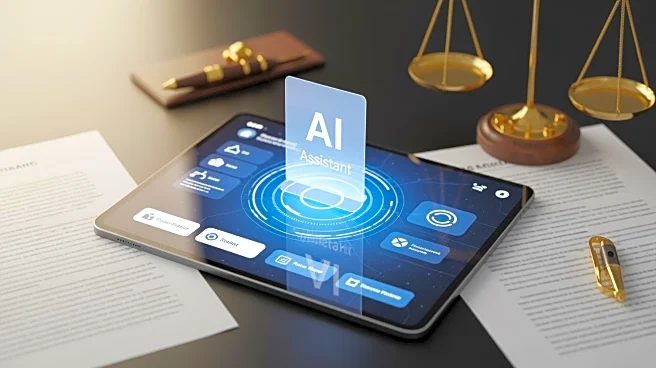What's Happening?
At the ClioCon 2025, Clio's founder Jack Newton emphasized the transformative impact of AI on solo and small law firms. The introduction of Clio Work, an integrated AI workspace, aims to level the playing
field by providing these firms with advanced capabilities previously accessible only to larger firms. Clio Work, powered by the AI engine Vincent, acquired through Clio's purchase of vLex, integrates various aspects of legal practice, including management, research, drafting, and workflow automation. This platform draws on a comprehensive legal database, ensuring that results are grounded in verified authority. The service is priced at $199 per user per month, making it accessible to smaller firms.
Why It's Important?
The integration of AI into legal practice is significant as it addresses the longstanding issue of access to justice. With 77% of legal problems currently unresolved, AI has the potential to reduce the time and cost of legal services, thereby expanding access. For solo and small firms, this represents a substantial business opportunity, as AI can enhance productivity and allow them to serve more clients efficiently. Clio's focus on these firms, despite its expansion into the enterprise market, underscores their importance in the legal ecosystem. By adopting AI, these firms can maintain their competitive edge and potentially capture a share of the projected $3 trillion latent legal market.
What's Next?
Clio's expansion into the enterprise market with Clio Operate suggests a dual focus on both large and small firms. However, the commitment to solos and smalls remains strong, with continued product improvements expected. As AI technology evolves, these firms are likely to see further enhancements in their practice management tools. The legal industry may witness a shift as more firms adopt AI, potentially leading to increased competition and innovation. Stakeholders, including legal tech companies and law firms, will need to adapt to these changes to remain relevant.
Beyond the Headlines
The ethical implications of AI in law are noteworthy. As AI becomes more integrated into legal practice, questions about the role of human judgment and the potential for bias in AI systems may arise. Additionally, the cultural shift towards technology-driven legal services could redefine traditional legal practice norms. The long-term impact on the legal profession, including potential changes in regulatory frameworks and the role of lawyers, will be areas to watch as AI continues to evolve.











